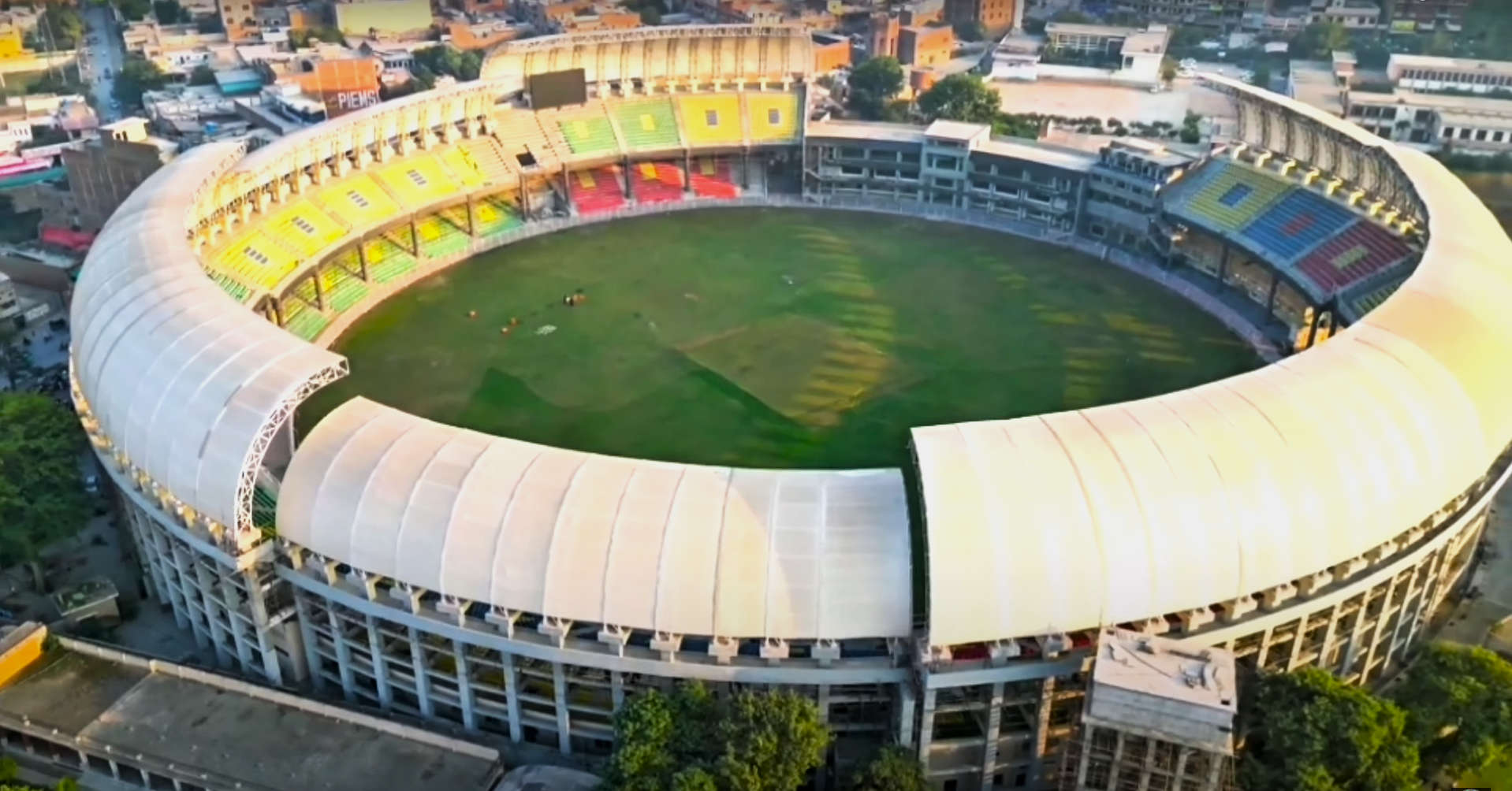By Khalid Khan
Placing their names on buildings and structures or tagging names on a project with public money is not a new phenomenon in Pakistan and almost every group in power has done it so far. The most popular are the Mian Family and Bhutto Family for this hobby. Whenever they start any project or construct a building or any structure, the first possibility is they would name it after the name of any living or dead person in their families.
However, except for Rawalpindi General Hospital (RGH), they have refrained from putting their name on any already constructed building/structure. RGH was renamed after the name of Benazir Bhutto because she succumbed to her injuries in its surgical emergency where she was moved after a suicide attack on her in Liaqat Bagh. Therefore, renaming RGH after her had a logic. However, the case of renaming Arbab Niaz Cricket Stadium is different and unique. Arbab Niaz Stadium was constructed in November 1984 replacing Peshawar Club Ground which had been the home ground for the Khyber Pakhtunkhwa cricket team since 1938. The stadium hosted its first international match in 1984.
The relentless campaign to embed Imran Khan’s persona into the fabric of Khyber Pakhtunkhwa continues unabated, as the provincial government spares no effort in ensuring his omnipresence in the public consciousness. In its twenty-fifth session, chaired by Chief Minister Ali Amin Gandapur, the provincial cabinet, apart from other measures, enthusiastically approved the renaming of Arbab Niaz Cricket Stadium to Imran Khan Cricket Stadium.

Despite ruling the province for three consecutive terms, Pakistan Tehreek-e-Insaf has neither built a new stadium nor formulated any concrete strategy for the promotion of sports. Yet, it has shown no hesitation in rebranding an existing stadium, shamelessly inflating the project’s cost in the process. Initially budgeted at 1.37 billion rupees in 2018, the stadium’s expenditure soared to 1.94 billion rupees in 2021 and now stands at a staggering 2.31 billion rupees in 2024. While Khyber Pakhtunkhwa grapples with rising terrorism and the complete breakdown of law and order, with international teams unwilling to play in Peshawar, sports continue to be politicized.
Arbab Shahzad, son of Arbab Niaz and former Chief Secretary of Khyber Pakhtunkhwa—who also served as an advisor to Imran Khan—has unequivocally rejected this renaming, denouncing it as an act of sycophancy aimed at pleasing the former prime minister. It is worth noting that Peshawar’s Municipal Corporation had originally named the stadium after Arbab Niaz in recognition of his services following his demise.
A distinguished figure, Arbab Niaz Muhammad Khan retired as a lieutenant colonel from the Pakistan Army and later served as the federal minister for sports, culture, and tourism in General Zia-ul-Haq’s cabinet. He had also held the office of mayor of Peshawar. His brother, Arbab Jehangir Khan, was a former Chief Minister of Khyber Pakhtunkhwa and a federal minister, holding the chief ministerial position from April 7, 1985, to May 1988. Over a 32-year-long political career spanning from 1970 to 2002, he remained undefeated, securing three national and four provincial assembly seats. Another of his brothers, Arbab Fateh Muhammad Khan, also served as Peshawar’s mayor.
Arbab Niaz’s legacy extends through his sons as well. Arbab Tariq held the mayoral position in Peshawar, Arbab Shahzad served as the Chief Secretary of Khyber Pakhtunkhwa and later as an advisor to Imran Khan, while Arbab Dost Muhammad served as the Commissioner for Afghan Refugees. The family’s political influence continues through Arbab Sher Ali, a current PTI member of the National Assembly and grandson of Arbab Niaz. The political lineage extends further to Arbab Alamgir, a former federal minister affiliated with the Pakistan People’s Party, whose wife, Asma Alamgir, has also held a ministerial portfolio. Their son, Arbab Zarak Khan, currently represents the PPP in the Khyber Pakhtunkhwa Assembly. Arbab Zarak is the son-in-law of former FIA Director General Akbar Hoti, whose father, Nawabzada Ghafoor Hoti, once served as Governor of Khyber Pakhtunkhwa.
The stadium’s historical significance is underscored by its hosting of the first-ever international One Day match in Peshawar between Pakistan and India on November 2, 1984. The last ODI at the venue, too, was played between the two arch-rivals on February 6, 2006.
Renaming public spaces—whether roads, buildings, or sports venues—is never a mere act of nomenclature. It carries profound psychological and historical weight. Many of the greatest figures in history fade from public memory over time, but those whose names are etched onto landmarks achieve a semblance of immortality. The practice of naming significant infrastructure after deceased individuals is a long-standing tradition, grounded in the idea of honoring legacies rather than indulging in contemporary political opportunism. Even Imran Khan himself has, in the past, spoken against the practice of naming projects after living individuals. Yet, in his characteristic manner, he has conveniently reversed his stance when it serves his own glorification.
The renaming of Arbab Niaz Cricket Stadium is nothing more than an attempt to engrain Imran Khan’s name into the minds of current and future generations for political gain. As the post-Imran Khan PTI era unfolds, the party will inevitably fall into the hands of a new political elite that continues to benefit from his cult of personality. This act of political branding, perhaps unprecedented in modern history, seeks to elevate a convicted figure to an exalted status. It is one thing to name national projects after martyrs who fought against foreign oppressors, but it is entirely another to do so for an individual convicted under the very laws of his own country.
Is this not a blatant effort to perpetuate the mythos of a convicted leader, to sustain his political relevance indefinitely? It certainly is. Such moves will only fuel further polarization and ensure that disruptive politics remain entrenched in Pakistan’s political landscape for years to come. This is not public service—it is outright Imranization.
